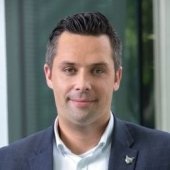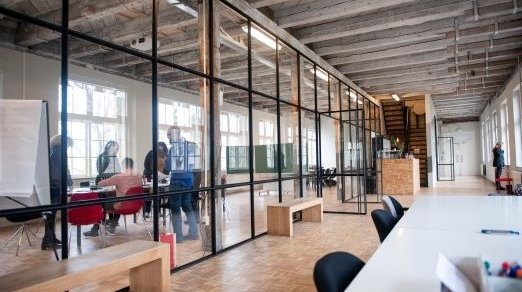Digital disruption: Futurologist and professor Dr. Stefan Gröner on leading through rapid change
IN BRIEF
- 7:35 - You need data analysts, you need software engineers, people like that in order to setup AI, but I’m pretty sure that in a couple of years, you will need another type of employee. People who have a broader interdisciplinary knowledge for instance or who are more creative in order to think ahead, in order to think about new markets.
- 12:45 - You have to lead by trust and not buy hierarchy, that’s super important. First, to attract more creative people and on the other side as well in order to be competitive in the future. Trust and flexibility are probably the most important leadership skills in the future.
- 16:33 - I’m pretty sure that we’ll have a much more flexible and a much more satisfying work life in the future. We’ll get rid of routine jobs. Work is definitely going to be more interesting and more satisfying.
Joe Kornik, Editor-in-Chief of Vision by Protiviti, sits down with Dr. Stefan Gröner, a renown German futurologist, professor, speaker, and consultant who helps business leaders set their company’s strategic course for the future. He is also Dean of Studies for Digital Management and Corporate Communications at Germany’s Fresenius University of Applied Sciences where his research areas are in the fields of digital transformation, digital communication of the future and business technologies of the future.
DIGITAL DISRUPTION: FUTUROLOGIST AND PROFESSOR DR. STEFAN GRÖNER ON LEADING THROUGH RAPID CHANGE - Video transcript
Joe Kornik: Welcome to the VISION by Protiviti interview. I’m Joe Kornik, Editor-in-Chief of VISION by Protiviti, where we look into the future to examine the implications of big topics that will impact businesses worldwide over the next decade and beyond. Today, I’m joined by Dr. Stefan Gröner, a renowned German futurologist, professor, speaker and consultant who helps business leaders set their company’s strategic course for the future. He is dean of studies for digital management and corporate communications at Fresenius University of Applied Sciences, where his research areas are in the fields of digital transformation, digital communication of the future and business technologies of the future. Doctor, thanks so much for joining me today.
Dr. Stefan Gröner: Yes. It’s a pleasure having me.
Kornik: I’m excited to speak with you, as your unique background as both a professor with expertise in the future of tech and your role as an adviser to C-level executives gives you a very unique perspective to talk about the future of work. Let’s start on the tech side. You talk a lot about digital disruption, its role in the future of work and why it’s so difficult for companies to adapt to all that disruption. Can you expand on that and talk about some of the common mistakes executives make and how we can avoid them?
Gröner: First, it’s important to know that disruption is nothing really new. Disruption was basically true all the time. Just think of the letterpress versus the handwritten letter, or the CD versus the audiocassette, or the smartphone versus the Nokia 3210. It’s, simply spoken, meaning that old business models are going to disappear or be less attractive due to new technologies of competitors which meet the customers’ need in a better way. It’s nothing new, but it is still so hard for companies, for the old players in the market, to adapt to the changes.
Out of my experience, competitors in the market usually tend to focus on their own products and less on the solutions and ecosystems. Take the example of the stagecoach: If you ask the stagecoach owner what the customer wants, they’ll probably say, “Improving my stagecoach — meaning more horses or more comfortable seats,” stuff like that, but was it really the true customer need? The true customer need was mobility, getting faster from A to B, and with the invention of the automobile, stagecoaching was out.
It’s always the problem for players in an existing market to say goodbye to their old business model, to say goodbye to their own products and become more focused on the real customer needs and solutions for the customers. This is not an example just of the past, it’s also true for the automotive industry at the moment, because when digitization arose, what did they do? They tried to put new features in their cars, improving their existing models. When new technologies came — like AI, like sensor technique, like platform technologies, stuff like that —new competitors with other skills came to the markets: Waymo, Uber and so on, they have new competencies. What I usually recommend is thinking more broadly of customer needs and having the courage to forget about your own product, but that’s hard. That’s super hard.
Kornik: You mentioned AI, and I wanted to stay on the tech side for the time being. It would be tough to have a discussion around the future of work without discussing AI. It’s obviously going to be incredibly impactful and important. What is most important when we talk about incorporating AI into our work lives of the future? What advice would you give?
Gröner: That’s a huge question. Simply speaking, what can I do with AI, or what can companies do with AI? First, they can increase their efficiency. They can automate processes. This is very important. This is the cost side, but on the other side, that is even more important. With the help of AI, you can predict your customer needs in a much better way — your customer needs and your customer actions — and you can learn much more about your customers. If you can do that, you’ll be able to adapt to changes way better.
This is pretty much what you can do with AI, but what do you need as a company? There are four important ingredients: First, it’s computing power. That’s why AI is so hot at the moment, because computing power increased dramatically over the last years. It’s algorithms, of course. You need algorithms. It’s data, and then it’s people. What is most important? Everything is important right here, but the most important is data and people. Why? Because you can buy computing power and you can buy algorithms. There are companies that provide that. You still need a couple of specialists to adopt that, but that’s a task you probably can do.
What you can’t buy is data. If you don’t have data about your processes, your market, your customers, then you can’t set up a working model. I usually recommend that it’s overdue to set up a data culture, which means collect all data possible and make it universally accessible to everybody in the company. Even if it’s through a department of your competitor as being a CEO, it’s super necessary. You have to do that if you don’t have data, and this is the most important factor of digital disruption: You probably can’t catch up anymore, because if you don’t collect data right now, your competitor is way ahead, and there is no chance of catching up.
The fourth factor is people, the human factor. At the moment, it’s still true that, of course, you need specialists. You need data analysts, you need software engineers, people like that, in order to set up AI, but I’m pretty sure that in a couple of years, once your AI works, you need another type of employee: people who have a broader interdisciplinary knowledge, for instance, or who are more creative in order to think ahead, in order to think about new markets. And that’s at the moment lacking, because even at university, we produce specialists right now. It’s getting way more important to produce generalists in order to face the challenges which are ahead.
Kornik: It sounds like there are some opportunities when it comes to jobs in AI, but what a lot of people think about when they think about the future of work and AI is, what impact will it have on their current jobs? Which jobs may go away with AI? Specifically, when it comes to jobs in the future and looking, let’s say, in 2030, you touched on it there, but how else do you think AI will impact the jobs that we’re doing right now, and how different those jobs may look in the future?
Gröner: There are a lot of fears around at the moment. Of course, there are new technologies, and nobody knows what’s really happening. If you want to put it positively, the happy news is, first, with the help of AI, you can get rid of boring, routine jobs. That’s the good news, definitely. There are a lot of studies, but in a huge percentage of all the jobs that are purely routine, with AI, you can get rid of that. On the other hand, you probably have to evolve other skills which are needed, and these other skills are more human skills like empathy, like creativity, stuff like that which I mentioned earlier. That’s probably the hardest challenge for people who are not used to think in that way, and only work their routines. There are chances — there are huge chances — but there are also some risks if you don’t want to adapt.
Kornik: I think we’d all agree that we’re in a time of rapid change. The pandemic accelerated some of the changes that were already in place, but all this change and all this technology has a profound impact on human beings. When we’re talking about the future of work, it’s how it’s going to impact those human beings. I’m sure this comes up a lot when you talk about strategy in your conversations with the C-suite and executives. What is crucial for executives to be focused on right now when it comes to leading through these times of rapid change and disruption?
Gröner: What I usually recommend are two things. I mean, there are two main challenges. First, you have to think, what kind of employees do I need in the future? As I already said, are these specialists at the moment for the next two or five years? Probably, yes, but then this is the kind of workforce you need in order to think of new markets, in order to think ahead and stuff like that, and I doubt that. It’s mainly necessary to start thinking about recruiting people with other skills than you have, like creative skills, broader knowledge and so on, in order to be prepared once your AI is set. That’s the first challenge. The second challenge is the leading challenge. If you want to work with more creative people who are at some points annoying or even demanding and stuff like that, you have to change your leadership style.
What is important is, the times of top-down leading are definitely out. There are couple of reasons: First, the world is way too complex in times of AI. You can’t get through all the algorithms with business analysts, with software engineers. It’s just not possible, first. Second, If you have an open mind, if you’re thinking new markets, you don’t have experience on that, and then you just have to trust. You have to trust your team. You have to lead by trust and not by hierarchy — that’s super important. First, attract more creative people, and on the other side as well, in order to be competitive in the future, trust and flexibility are probably the most important leadership skills in the future.
Kornik: Those leaders are the future, and leaders of today, ultimately, are going to be leading multiple generations. That’s one of the trends that we’re seeing as we look forward. People will be taking potentially second careers, or people may not actually retire at the same age as they have. Maybe they’ll work part-time. There’s a lot of that that’s going on. When you look at the younger generations, what stands out to you in terms of their style or their priorities for what they’re looking for, attracting them, retaining them, recruiting them? You talked about that in your last answer. What will fundamentally be different about that generation in their working style and then, ultimately, as they become leaders down the road?
Gröner: First, I need to break a lance for this generation. I’m an oldster, and I have a lot to do with younger people — that’s basically why I’m at the university. I have to break the lance because stereotypes are, they are egocentric, they’re only leisure-oriented, stuff like that, but almost every one of my master’s students, they have a 30-hour-plus job in the industry, in addition to a very demanding curriculum. That’s much more than I was willing to do when I was studying. They are pretty focused, but the main difference is, when I started working, it was more like, “Here’s the job — do it,” and I did it because that was ordered at some point, and I just did it, because I wanted to make a career.
The younger generation — and I don’t think it’s a bad sign — they are purpose-oriented. They want to see a sense of what they’re doing. They want to see some kind of purpose. They want to understand why they’re doing something, and they’re much more critical. That’s a good sign.<>On the other hand, if you’re not willing to listen to them, then probably it’s hard to retain them, then they are just gone, and then you lose a huge opportunity in order to get other perspectives in order to learn more about new skills. They are digital natives. I learn every day at the university. I teach them a lot about strategy, of course, but I have no idea of some stuff they are doing, and I learn. Listening is an important task for leaders of the future, and then, if you listen and if you build up trust and if you explain stuff, if you say, “This is the purpose — that’s why I’m doing that,” if you try to put empathy on them, then you can attract and retain them.
Kornik: A lot of interesting insights. We’ve covered a lot. I know there’s probably a lot more that we could cover, but I would like to wrap up here by asking you to look out with me to 2035 and give me a couple of predictions about, what will be different when it comes to the future of work? What might surprise us? What are we not anticipating? What shall we be expecting in 2035?
Gröner: I always tend to think positively, so I only want to bring some happy news at the end. I’m pretty sure that we’ll have a much more flexible and a much more satisfying work life. We’ll get rid of routine jobs. We’re going to be encouraged about more job enrichment and more time spent thinking ahead, stuff like that. It’s going to be definitely more interesting to work, and less boring and more satisfying. What you need — and that’s super important — you need more empathy. You need more creativity.
This is not only true for leaders. It’s crucial for leaders, but it’s also crucial for employees, because if you don’t have that and you don’t try to get some kind of creativity in your life, if you don’t try to think ahead, if you do not try to be open-minded, if you do not try to make your own decisions, and just follow, then you’re going to be replaced, most likely, by algorithms or robots in the near future — probably not only in the workspace, but also in your private life. That’s what I’m saying to my students: “Try to be creative. Open your mind and think on your own — then, everything is going to be good.”
Kornik: Excellent. Thank you so much, Dr. Stefan Gröner, for the time today and those insights — really valuable from the two different perspectives that you’re able to bring to the discussion today. Thank you so much for joining me.
Gröner: Yes, thank you. It was a pleasure.<>Joe Kornik: For you at home, thanks for watching. I’m Joe Kornik. We’ll see you next time.
Did you enjoy this content? For more like this, subscribe to the VISION by Protiviti newsletter.






























